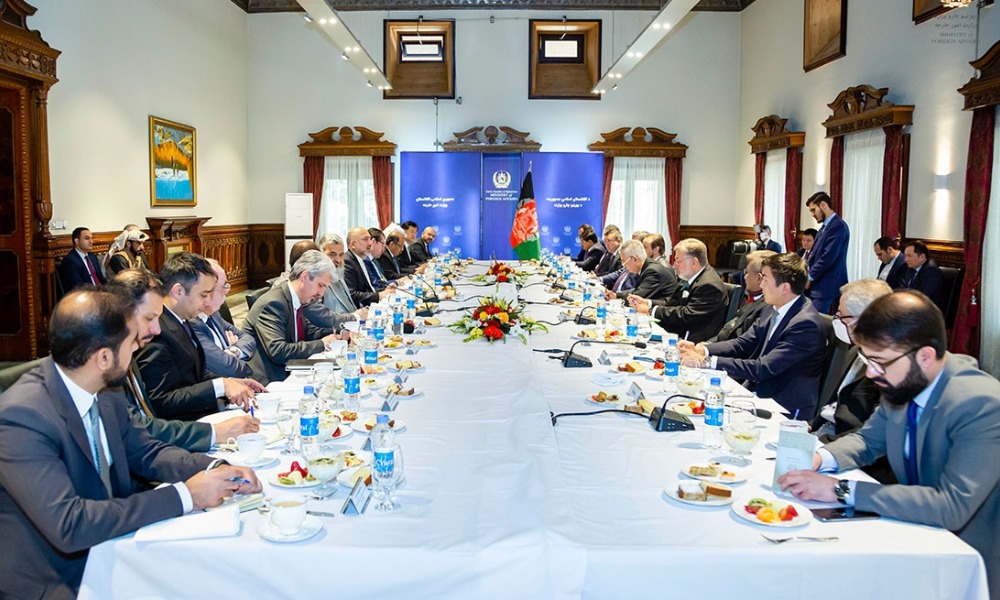Latest News
International community expresses concern over escalation of violence in Afghanistan

International communities have expressed their “deep concern” over the escalation of violence and targeted killings of civilians in Afghanistan.
The sixth round of consensus-building meetings for peace in Afghanistan was held in Kabul on Thursday.
Foreign Minister Mohammad Haneef Atmar, high-ranking government officials, ambassadors, and representatives of Asian and European countries, and Afghanistan’s regional and international partners had participated in the summit, the Ministry of Foreign Affairs said in a statement.
“Ambassadors and representatives of regional and international countries and organizations, while expressing their deep concern over the escalation of violence and targeted killings of civilians, have reiterated their support for the continuation of peace negotiations and advancing the Afghan-led Afghan-owned peace process,” the statement said
“They also welcomed and supported the efforts and principled stance of the Afghan Government towards the fulfillment of the commitments by all involved parties, the establishment of a ceasefire, and achieving a comprehensive political solution commensurate with the will of the Afghan people,” the statement read.
According to the statement, FM Atmar has briefed the participants about the challenges of the second round of peace talks, Taliban’s regional trips and the group’s failure to live up to its commitments, the Islamic world’s solidarity in condemning war and supporting peace, and the importance of regional and international consensus for the success of the Afghan peace process.
He noted that reducing violence, severing ties with terrorists, advancing sincere and meaningful negotiations, and preventing the released Taliban prisoners from returning to the battlefield “were four major commitments that the Taliban failed to fulfill.”
“Minister Atmar also welcomed the new U.S. administration’s decision to review the Taliban’s compliance with their commitments based on the U.S.-Taliban agreements, calling it an essential step for advancing the Afghan peace process.”
Meanwhile, Mohammad Qasim Halimi, Minister of Hajj and Endowments, discussed the formation of a broad consensus in the Islamic world for ending bloodshed and realizing peace in Afghanistan.
The Islamic countries, reputable institutions, and organizations (like OIC & MWL), well-known personalities, and Muftis of the Islamic world (like Sheikh Qarzawi) have consistently disapproved of the war in Afghanistan, Halimi said.
The Islamic countries and organizations have reiterated that attacking schools and universities, destroying infrastructures, and killing innocent civilians were in stark violation of the principles and teachings of the holy religion of Islam, Halimi added.
Latest News
Japan allocates nearly $20 million in humanitarian aid for Afghanistan

The Embassy of Japan in Afghanistan announced on Friday that the country has allocated $19.5 million in humanitarian assistance to Afghanistan.
In a statement, the Japanese Embassy said it hopes the aid will help bring positive change to the lives of vulnerable Afghans.
According to the statement, the assistance will cover the basic humanitarian needs of vulnerable communities in Afghanistan.
The embassy added that the aid will be delivered through United Nations agencies, international organizations, and Japanese non-governmental organizations operating in Afghanistan.
Japan’s total assistance to Afghanistan since August 2021 has reached more than $549 million.
Latest News
Afghan border forces prevent illegal entry of hundreds into Iran

Security forces at the Islam Qala border in Herat province prevented hundreds of young Afghans from illegally entering Iran.
Officials from the 207 Al-Farooq Army Corps said that around 530 people attempted over the past two days to illegally enter Iranian territory through areas of Kohsan district in Herat, but border forces detained them and transferred them back to their original areas.
Meanwhile, officials in the local administration of Herat said that due to severe cold along the illegal migration route to Iran, three Afghan migrants have lost their lives in the Kohsan district of the province, and a shepherd has also died there for the same reason.
Mohammad Yousuf Saeedi, spokesperson for the Herat governor’s office, said that some statistics and images shared on social media regarding the incident are not reliable.
According to him, further investigations are underway to determine whether any individuals have died on the other side of the border.
Latest News
US pauses green card lottery program after Brown University shooting

President Donald Trump suspended the green card lottery program on Thursday that allowed the suspect in the Brown University and MIT shootings to come to the United States.
Homeland Security Secretary Kristi Noem said in a post on the social platform X that, at Trump’s direction, she is ordering the United States Citizenship and Immigration Services to pause the program, the Associated Press reported.
“This heinous individual should never have been allowed in our country,” she said of the suspect, Portuguese national Claudio Neves Valente.
Neves Valente, 48, is suspected in the shootings at Brown University that killed two students and wounded nine others, and the killing of an MIT professor. He was found dead Thursday evening from a self-inflicted gunshot wound, officials said.
Neves Valente had studied at Brown on a student visa beginning in 2000, according to an affidavit from a Providence police detective. In 2017, he was issued a diversity immigrant visa and months later obtained legal permanent residence status, according to the affidavit. It was not immediately clear where he was between taking a leave of absence from the school in 2001 and getting the visa in 2017.
The diversity visa program makes up to 50,000 green cards available each year by lottery to people from countries that are little represented in the U.S., many of them in Africa. The lottery was created by Congress, and the move is almost certain to invite legal challenges.
Nearly 20 million people applied for the 2025 visa lottery, with more than 131,000 selected when including spouses with the winners. After winning, they must undergo vetting to win admission to the United States. Portuguese citizens won only 38 slots.
Lottery winners are invited to apply for a green card. They are interviewed at consulates and subject to the same requirements and vetting as other green-card applicants.
Trump has long opposed the diversity visa lottery. Noem’s announcement is the latest example of using tragedy to advance immigration policy goals. After an Afghan man was identified as the gunman in a fatal attack on National Guard members in November, Trump’s administration imposed sweeping rules against immigration from Afghanistan and other counties.
While pursuing mass deportation, Trump has sought to limit or eliminate avenues to legal immigration. He has not been deterred if they are enshrined in law, like the diversity visa lottery, or the Constitution, as with a right to citizenship for anyone born on U.S. soil. The Supreme Court recently agreed to hear his challenge to birthright citizenship.
-

 Latest News5 days ago
Latest News5 days agoGermany speeds up admission of Afghans from Pakistan
-

 Sport5 days ago
Sport5 days agoIPL 2026 Auction set for Abu Dhabi with $28.6 million purse at stake
-

 Latest News5 days ago
Latest News5 days agoAfghanistan to establish independent oil and gas authority
-

 Latest News5 days ago
Latest News5 days agoUS intelligence chief warns of ‘direct threat’ from suspected terrorists inside the country
-

 Latest News4 days ago
Latest News4 days agoIEA supreme leader stresses enforcement of Sharia law and sincere public service
-

 International Sports5 days ago
International Sports5 days agoILT20: Desert Vipers qualify for playoffs with five-wicket win over Dubai Capitals
-

 World5 days ago
World5 days agoFather and son behind Bondi Jewish festival shooting that killed 15, Australian police say
-

 International Sports5 days ago
International Sports5 days agoATN secures broadcast rights for four major AFC sporting events
























